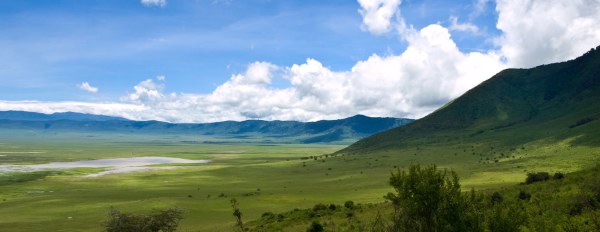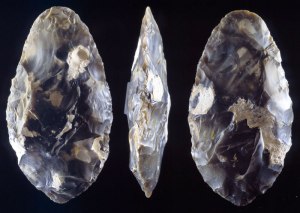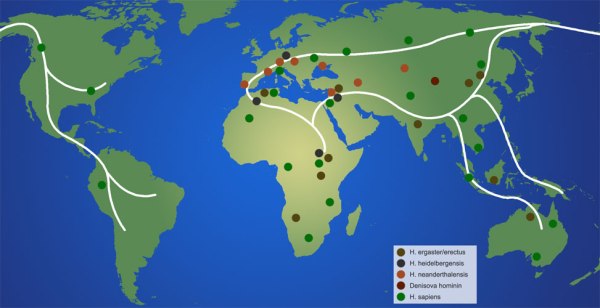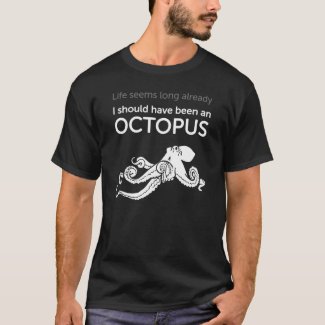Success by denaturation
You find yourself on a mountain slope, overlooking a wide green valley. The sun is beating down, but is not all that hot yet; after all, it’s still only mid-morning. You can smell the wet dirt from last night’s rainfall and the air is dense with the noise of insects. In the distance, big herds of wildebeest and zebra are slowly moving across the plain, eagerly feeding off the fresh green grass. A small group of elephants are drinking by the shallow river, two of the smaller calves are playing in the water, spraying muddy water from their trunks into the air. White-backed vultures are circling high above, riding the thermals, looking for carrion. This is Ethiopia. Or rather, it will be – in another 1.7 million years.
Turning east, you can make out a thin pillar of smoke rising from the mountain slope. Moving closer, you realise it’s smoke from a campfire; there are humans around. Soon you can hear them, and carefully looking through some dense shrubs you can see them too: a family group of some 15-20 people, collected around the fire getting ready to have breakfast. They talk and laugh, and the children are running around, chasing each other with small twigs in their hands. It’s all very idyllic and familiar, but these aren’t modern humans. They don’t even belong to our species. What you’re looking at are the evolutionary grandparents of modern humans – this is Homo ergaster.
The campfire in the middle of the clearing is more than just a fire. It’s more than the latest advance in technology. It’s more than a heat source or a means of protection. It’s more than a tool for hardening wooden spearheads and curing animal skin. It’s more fundamental than that. Fire is intrinsically linked with the evolution of humans; it’s the reason we’ve evolved to the modern form, abandoning the ‘chimpanzee-on-two-legs’-look that we’ve favoured for millions of years. Fire made us human. It shaped our evolution and kick-started the rapid increase in brain size.
Fire, fire
What is so special about fire, then? Sure, it’s a convenient tool and useful in many different ways, but claiming it to be the origin of man is a bit preposterous, isn’t it? Well, no, actually, it’s a plain scientific observation. Fire allowed us to do something no other human species – or indeed any other primate – had been able to do: cook our food.
Life is a constant struggle. Perhaps not so much today, but 1.7 million years ago it certainly was. And for our great-great-great-uncle Homo habilis – the chimpanzee-on-two-legs I mentioned above – this was particularly true. They were small creatures, only standing 1.3 m (4′ 3″) tall, and they had none of the advanced tool-making to help them like Home ergaster had. They really weren’t much more than bipedal apes.
Homo habilis inhabited the same grassy plains in Africa as Homo ergaster. In fact, they co-inhabited, and would no doubt have met on numerous occasions. But even though they were from the same era of human evolution they couldn’t have been more different. Homo habilis had a very flat nose and a protruding jawbone. Big jaw muscles flanked its face, allowing it to chew on tough roots and nuts. By comparison, Homo ergaster could easily have passed for a modern human if dressed in the right clothes. Sure, they still had pronounced eyebrow arches and a sloping forehead but the body was more or less indistinguishable from ours – tall and muscular and made for running.
So what had happened? What had transformed the tiny bipedal chimp to an Olympian athlete? Food. Cooked food. And not even a change in diet; Homo ergaster was eating more or less the same things Homo habilis was: roots, nuts, fruits and the occasional small animal. The difference was that ergaster was cooking its food whilst habilis was eating it raw. And what a difference it made. By heating up the vegetables and meat, fibres were softened and broken up and proteins were denatured. This not only made nutrients more readily available, but it also made the food easier to chew. As a result, it allowed ergaster to devolve those big jaws and jaw muscles, and the additional easy-access nutrients created spare time from foraging; time that could be put to use experimenting with tool-making and developing cultural behaviours. The combination of all this lead to ergaster growing its brains, starting with a 50% increase (compared with habilis) and ending up even bigger some 500,000 years later.
Good food, big brain
That big brain came to good use. The environment was becoming more and more volatile and changeable, with long droughts replaced with lush forests and lakes. The climate was turning unpredictable and only the most adaptive of creatures could keep up.
The increased brain also allowed Homo ergaster to evolve a complex spoken language, which helped them communicate effectively and allowed them to live in bigger social groups, cooperating and helping each other.
It also made us the most deadly assassins ever to have walked the earth. No animal, big or small, was safe, and we had soon developed methods and weapons that allowed us to hunt prey so effectively that we could count on a regular diet of meat.
The energy-rich diet also allowed us to grow tall, reaching 1.9 m (almost 6′ 3″). In addition, it would help in maintaining an even bigger and even more expensive brain, starting an evolution of brain size growth that only ended with the Neanderthals reaching the absolute maximum* possible. Anything bigger, and it would be impossible for a human female to give birth to the baby.
And finally, the new cooked diet made it possible for us to venture out of Africa, exploring Asia and Europe. This gave rise to a whole new species of humans which, if longevity is to be the criteria, was the most successful of them all: Homo erectus. Meanwhile, back in Africa, ergaster turned into Homo heidelbergensis, emigrated again to Asia (evolving into Denisovans) and to Europe, turning into Neanderthals. Later still, heidelbergensis became Homo sapiens, emigrated from Africa (again), colonising Europe (again) and Asia (again) and eventually – for the first time ever – reaching the New World. We had finally colonised the whole world**.
‘Natural’? Don’t talk to me about ‘natural’!
It’s amazing to think that all this, all that is human, is a result of the simple use of fire to cook our food. If we hadn’t discovered fire, we would still be the same bipedal apes that was Homo habilis. Or rather, we’d have gone extinct. Homo habilis didn’t make it. They just weren’t flexible enough, inventive enough or curious enough.
So don’t come and talk to me about ‘natural’ and how good everything natural is. Homo habilis were natural and now they’re dead. By contrast, Homo ergaster used technology to change what they ate and to alter themselves physically – both their bodies and their brains. This was far from natural, but it allowed them to evolve and adapt. And their descendants are still here today, populating the planet – one of which is currently writing this blog post. Being natural is for fossils; embracing technology is the future. And it’s still as true today as it was 1.7 million years ago.
* Neanderthals had the biggest brain any human species ever had, with females having an average brain capacity of 1,300 cc and males 1,600 cc. Compare this with our own average brain capacity of 1,100 cc for women and 1,350 cc for men.
** Except Antarctica, which we only started to colonise some hundred years ago.


















I have an energy-rich diet. How come I’m not 6’3″? I want to be that tall.
I seriously never thought of it this way. Not even a little. That having cooked food would free up our time for other things, allowing our brains to get bigger, and allowing us to evolve.
And I love that it all leads back to embracing technology. So it’s probably good that I got a cell phone finally all those years ago, right? Or I’d still be back in the Stone Ages? Heh.
LikeLike
We don’t ALL grow to be 6′ 3″. But some of us do. And Homo habilis never did.
It is kind of awesome, isn’t it? That roasted vegetables caused the evolution of our species.
Yes, we can’t over-estimate the importance of technology. If anything, we need to embrace it even more. How about cyborgs? Integrated circuits in our brains? Enhanced synthetic vision? We could be super-heroes, every one of us!
LikeLike
So probably there’s not a growth spurt waiting for me? Dammit.
I think you’re already a superhero. You’re a sciency superhero. I’m…um…an all-caps superhero. We fight crime in a very strange, but vital, way.
LikeLike
No, probably not. Sorry.
Yes, we are. But we could be even cooler with some synthetic augmentations. How long do we have to wait for the future really?
LikeLike
Probably a long time. No flying cars yet. I keep checking for you, though. Just in case.
LikeLike
Thanks. You’re probably right, although I sort of wish you weren’t.
LikeLike
Brain size.
So our brains have shrunk since our peak as Neanderthals?
“All” they had to do was stay out of the way of some animals and attack others whilst keeping a healthy distance from the fire.
Now we have complex language (often multiple), abstract thoughts (everything from empathy to rocket science), more responsibilities (we need to keep down at least one job), continuous development (education, training, etc.) and a massive influx of information through news sources, gossip and raw data.
Yet we do this with less “capacity”? Perhaps we’ve passed our prime.
And the female not being able to give birth to a larger brain, come on evolution, up your game. Make the brain bigger AFTER it’s popped out. I guess this might shed some light on Reticulian birthing, with their huge heads and very slight bodies perhaps they depend entirely on “EVF” … or don’t actually exist.
LikeLike
Actually, to answer my own question. Of course! THAT’S why they abduct our women and impregnate them with hybrids. So we get the pain, they get the baby.
Anyway, I digress.
LikeLike
Yes… Somewhat.
LikeLike
Actually, we didn’t evolve from Neanderthals. They’re more like our cousins. We represent another, independent branch on the tree of human evolution. The Neanderthal branch resulted in humans with a bigger brain than what we have, for reasons still unknown. What is known is that Neanderthals were very good at surviving in the cold and densely forested northern European continent during the last glacial period.
The reason they didn’t make it could have been that they were too good at that, and therefore too specialised and not able to adjust quickly enough when the interglacial started. At the same time, our own species migrated to Europe from Africa, and were already well adapted to the new landscape that was emerging here.
LikeLike
Oh dear, my ignorance was showing there. I knew that we weren’t evolved from Neanderthals (well, most of us), honest!
LikeLike
We did interbreed with them though. Or at least non-African people did, and we still carry some of their DNA within us. Which is pretty cool.
LikeLike
Equivocation, I say! “Natural”, after all, is one of those words with more than one meaning. If a tree falls and bends the frame of a bike, it may be natural in the sense of “stuff that happens without artifice”, but the resulting bent frame is contrary to the nature of a bike. Medicine, in contrast, may be “unnatural” in the sense of “stuff that doesn’t just happen without artifice”, but it actually supports human nature, insofar as it allows a particular quantity of matter to go on being informed by it for a bit longer.
The problem is, people don’t usually clarify which of the very many extant senses of the word “natural” they mean when they use it. Or, they themselves might not know. Language is fickle by nature (ha!), and its use requires diligent care.
LikeLike
It is true that the word natural has more than one meaning, And – as you quite rightly pointed out – most people use it in a singular meaning; either by choice or due to not being aware of alternative meanings.
My my point is that the word ‘natural’ is very often used in the sense of being a good thing, a thing aligned with the order of our world and outside the direct control of us. As you put it: something that happens without artifice. And, by using the word in that context, I tried to prove that ‘natural’ is not always beneficial. In fact, it can be the agent of doom.
So, since I don’t think I’ve used it in more than one context in this post, I call your claim for equivocation in this instance to be void.
(But I do appreciate your comment, and it’s always good to get feedback on one’s posts and the content therein. So thank you!)
LikeLike
“So, since I don’t think I’ve used it in more than one context in this post, I call your claim for equivocation in this instance to be void.”
Fair enough. I tend to be a bit jumpy when it comes to it because, let’s face it, the development of technology, at least since Francis Bacon, has to a large degree been viewed as man’s triumph over “nature”. True, we’ve inched away from the image of the scientist torturing Mother Nature like a witch on the rack, twisting and prodding her till she coughs up her secrets along with her blood. Yet, there remains this triumphalist attitude that has led–and I fear will continue to lead–to abuses of the earth’s environments and ecosystems.
I think that we would be better served–and speak more truly–if we described technology as what we get when we learn nature’s laws, and subordinate our tools to them with docility.
LikeLike
Quite so. Although I tend to view technology as an extension of our own ‘natural’ capabilities by means of using our intelligence and curiosity. It’s simply what give us an edge against our competitors, just in the same way a pit viper’s edge is its ability to ambush small nocturnal mammals and birds using its infrared sensors as a ‘sixth’ sense.
LikeLike